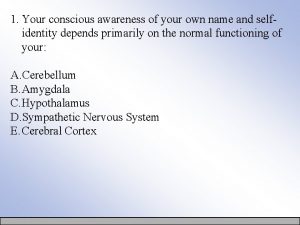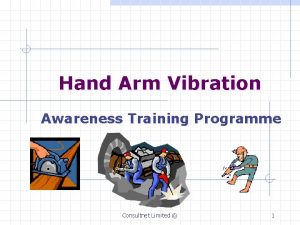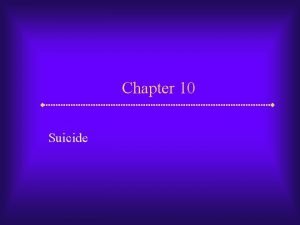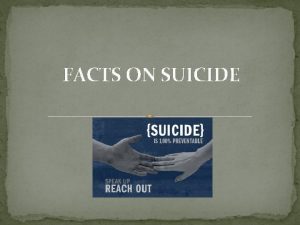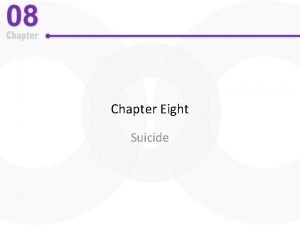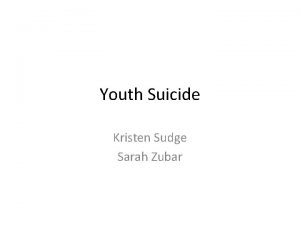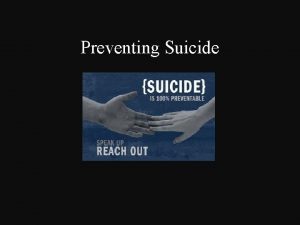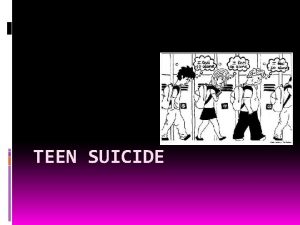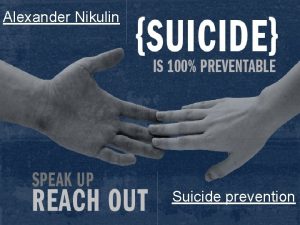Suicide Awareness Raise your hand if you personally
















- Slides: 16

Suicide Awareness --Raise your hand if you personally know someone who has tried to commit suicide or completed suicide? --What are some reason that our society is reluctant to openly discuss suicide? --Intervention services --Statistics --Myth and facts about suicide-what do you already know --Warning signs --Ways you can help someone you suspect is suicidal --Risk factors: what makes teens more vulnerable to suicide attempts?

Statistics --I want you to take a guess at how many young people in the United States ages 15 -24 die annually. --Approximately 5, 000 young people die annually (14 a day) from suicide attempts. --Approximately 700 young people die annually (2 deaths a day) from suicide attempts in Canada. --Approximately 300 young people die annually (roughly 1 each day) from suicide attempts in Australia. --In a recent state survey, more than one in every 10 (10%--15%) high school students reported having attempted suicide; nearly one in four (20%--25%) had seriously considered it. Centers for Disease Control

Myth and Facts Myth Suicide usually occurs without warning. People who talk about killing themselves rarely do it. If you ask a person if they are suicidal, you will encourage them to do it. Thoughts occur first… Most people who have talked about committing suicide have talked about it before. Threats must always be taken seriously. People who are suicidal will feel relieved that someone cares and those that are not suicidal will not be affected by the question.

Myth and Facts If someone makes a suicidal comment when drunk or high you should take it seriously. People under the influence may be at greater risk of acting on suicidal thoughts because their judgment is impaired and they are more impulsive. All people who commit suicide are mentally ill. Many people who feel suicidal are not mentally ill. They may be in a period on intense emotional crisis or in a deep depression.

Myths and Facts All suicidal people want to die. A suicide attempt is often a cry for help. The person may be asking for help to live. When a suicidal person seems calm and serene, there is no longer any danger of suicide. A suicidal person who suddenly acts calm and serene may have decided to commit suicide and therefore feels relief that a decision has been made.

Myths and Facts Once a person is suicidal, he or she will always be suicidal. Many people consider suicide for only a brief period in their lives. A person who attempts suicide and survives may never attempt it again if proper support and treatment are found. The tendency toward suicide is inherited and passed from parent to child. Suicide is a behavior and cannot be inherited. However, if a parent commits suicide, a child may see suicide as a way to solve problems and is statistically more likely to have a suicide attempt at some point in their life.

How do we know if someone is contemplating suicide? Withdrawal from friends and family Showing signs of sadness, irritability, and hopelessness Change in appetite, weight, behavior, and/or level of activity or sleep Loss of energy Making negative comments about self Recurring suicidal thoughts or fantasies Sudden change from severe depression to being “at peace” may indicate that they have decided to attempt suicide Talking, writing, or hinting about suicide

What should we do/say when someone says they are going to kill themselves? Be direct. Talk openly and matter-of-factly about suicide. Be willing to listen. Allow expressions of feelings. Accept the feelings. Be non-judgmental. Don't debate whether suicide is right or wrong, or whether feelings are good or bad. Don't lecture on the value of life. Get involved. Become available. Show interest and support. Don't dare him or her to do it. Don't act shocked. This will put distance between you. Don't be sworn to secrecy. Seek support. Offer hope that alternatives are available but do not offer glib reassurance.

When to get immediate help Writing or verbally communicating: I am going to kill myself, I am going to take these pills, ect… Talking about feeling hopeless or having no reason to live. Talking about ways of dying or looking for a way to kill oneself; especially when there’s an actual plan. Get Help You should not try to help this person on your own. If they are in immediate danger, call 911. If they don’t seem to be in immediate danger, please make sure that you tell someone who can help this person. No matter what, get this person the help they need. Let an adult know like a parent or your school counselor—any adult in your school can help. You can also call the crisis hotline for support.

Easy steps to remember v Show You Care v What might seem trivial to you can be overwhelming to the person in pain. v Ask the Question v If the person is saying: “I can’t go on, ” ask, “are you having thoughts of suicide? ” You are not putting ideas in their head. You are showing that you take them seriously and that it is ok to share their pain with you. v Get Help v Stay do no leave the person alone unless there is risk of harm to yourself. Just show patience and caring. Avoid arguments and advice giving I am worried about you; about how you feel You mean a lot to me; I want to help I’m here, if you need someone to talk to

Social Media Will you be more likely to hear or see in writing the signs we just went over? v Tumblr v Twitter v Facebook v You. Tube v Text v http: //www. suicidepreventionlifeline. org/gethelp/online. aspx

Risk Factors Biological Family history of alcohol/other drug abuse Genetics Physical appearance Being a teenager or young adult Disability or illness Sexual orientation Anxiety Depression Sociological/Familial Witnessing alcohol/other drug abuse Loneliness Exposure to suicidal behaviors and completion Relationship problems Academic stress Divorce Pregnancy

Risk Factors Sociological/Familial Death Physical, sexual, and/or emotional abuse Access to firearm/s Chronic crises Divorce Pregnancy Bullied or disenfranchised (not getting the same treatment or having fewer rights and considerations because one is not the “norm. ” Cognitive/Psychological I am too stupid I am not worthy Things would be better if I was not around I am a burden to everyone I hate myself Emotional Sadness Fear Hopelessness

Warning Signs Existential Life is useless Things will never get any better What’s the point of trying The whole world is empty

Resources http: //www. suicidepreventionlifeline. org/gethelp/onli ne. aspx 1 -800 -273 -TALK (8255) Teen Link 1 -866 -TEENLINK (833 -6546) A confidential helpline evening from 6 -10 www. carecrisischat. org

So what can I do to help? Stay: Get Help: Contact a trusted adult Dial 1 -800 -SUICIDE and put them on the phone.
 Please raise your right hand and repeat after me
Please raise your right hand and repeat after me Raise your hand teams
Raise your hand teams Let's go 1 unit 2
Let's go 1 unit 2 Syntactic
Syntactic Does god know me personally
Does god know me personally How to know god personally four spiritual principles
How to know god personally four spiritual principles Personally identifiable information pii training 1 hour
Personally identifiable information pii training 1 hour Self directed play
Self directed play Mobile crane hand signal chart
Mobile crane hand signal chart Zoom raise hand
Zoom raise hand Privacy awareness and hipaa privacy training cvs answers
Privacy awareness and hipaa privacy training cvs answers Your conscious awareness of your own name and self identity
Your conscious awareness of your own name and self identity Raise your love
Raise your love Rf score
Rf score You put your right foot in
You put your right foot in Hand arm vibration awareness training
Hand arm vibration awareness training You say you love the rain
You say you love the rain











